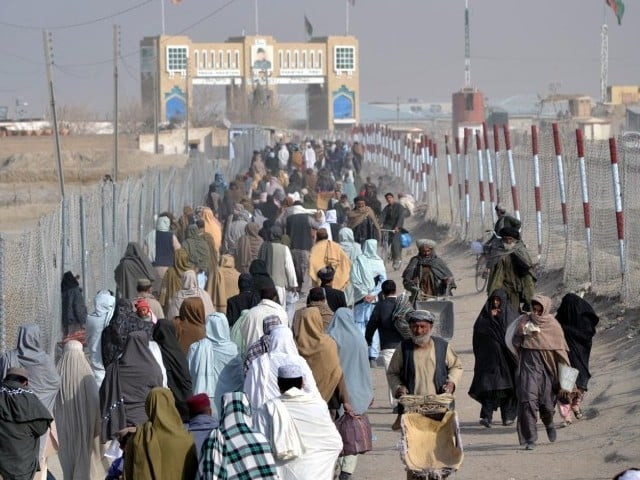Federal cabinet: Afghan refugees’ repatriation policy deferred
Directs provinces to ensure payments to sugarcane farmers

Pakistan receives acknowledgment for its contribution to the refugee crisis
PHOTO: INP
‘Afghan management and repatriation policy 2018’ was part of the 16-point agenda items of the cabinet huddle presided over by Prime Minister Shahid Khaqan Abbasi.
The item was moved by the States and Frontier Regions (SAFRON) Division to provide a detailed roadmap for uninterrupted repatriation of the Afghan refugees back to their homeland in the on-going year.
Afghan refugees:US averse to Pakistan’s repatriation plan
A cabinet member, requesting anonymity, told The Express Tribune that the said agenda item was deferred after it was decided that the matter needed further consultations with the relevant stakeholders – including Khyber-Pakhtunkhwa and Balochistan governments before devising detailed policy.
During the cabinet meeting held last Wednesday, approval to allow 60-day extension to the Afghan refugees’ stay in Pakistan till March 31 was granted.
Under a trilateral agreement signed by Pakistan, Afghanistan and the United Nations, Pakistan has issued Proof of Registration (PoR) cards to the Afghan refugees who are registered with the United Nations High Commissioner for Refugees (UNHCR).
The PoR cards allow the refugees to live in Pakistan for a fixed time period set by the federal government, take up jobs in the country and even purchase property.
On December 31, 2017, the related extension given by the federal government to registered Afghan refugees’ stay in Pakistan expired following which the federal cabinet approved 30-day extension – the shortest ever – for Afghan refugees, which came into effect from January 1.
Official sources privy to the matter said Afghanistan wanted Pakistan to extend Afghan refugees’ stay “at least by this year-end” while the government was in no mood to entertain the request.
The proposal to extend the refugees stay by June 30 also remained under consideration but following the input of the security agencies, suggesting involvement of several Afghan refugees in terrorist activities, violence and other heinous crimes in Pakistan, the cabinet approved 60-day stay on January 31, upon the expiry of previous extension.
Meanwhile, of the 16 agenda items that were to be taken up by cabinet, five agenda items (including the Afghan refugees’ repatriation policy) were deferred.
The other four items included establishment of Human Rights Court under the National Commission for Human Rights Act 2012, tap issuance of International Sovereign Bond, grant-in-aid to the High Court Bar Association Bahawalpur and appointment of accountant members in Appellate Tribunal, Inland Revenue Bench II Karachi.
One approved item regarding legislation over establishment of the Institute of Science and Technology Bahawalpur was not part of the cabinet’s original official agenda but was included later, sources said.
Extension in Afghan refugees’ stay beyond June 2018 unlikely
According to the PM Office, the items approved by the cabinet included signing of memorandum of understanding on cooperation in the field of information between the Committee on Television and Radio of Tajikistan and Ministry of Information, Broadcasting and National Heritage of Pakistan.
Signing of MoU for cooperation in the field of labour and training between Pakistan and Oman; signing of arrangements on mutual cooperation in the field of justice administration between the Ministry of Law and Justice of Pakistan and Ministry of Justice of Tunisia.
The cabinet also approved a proposal to appoint Syed Kausar Abbas Zaidi, District and Sessions Judge, as Judge Special Court (Anti-Terrorism-I) Islamabad.
Notifying maximum retail price (MRPs) of various drugs as well as reduction in prices of drugs in line with the Drug Pricing Policy.
Appointment of Dr Sheikh Akhtar Hussain on the post of Chief Executive Officer, Drug Regulatory Authority of Pakistan for a period of three months ( The cabinet directed Ministry of National Health Services to expedite process of appointment of regular CEO of Drug Regulatory Authority.) Appointment of members of Board of Directors of Pakistan State Oil Company Limited (PSOCL) and Pakistan Petroleum Limited (PPL).
On the issues being faced by sugarcane growers, the federal cabinet while showing its concern directed the provincial governments to fulfill their responsibility towards ensuring prompt payments, at notified rates, to the farmers by sugar mills immediately, a statement from the PM Office said.



















COMMENTS
Comments are moderated and generally will be posted if they are on-topic and not abusive.
For more information, please see our Comments FAQ